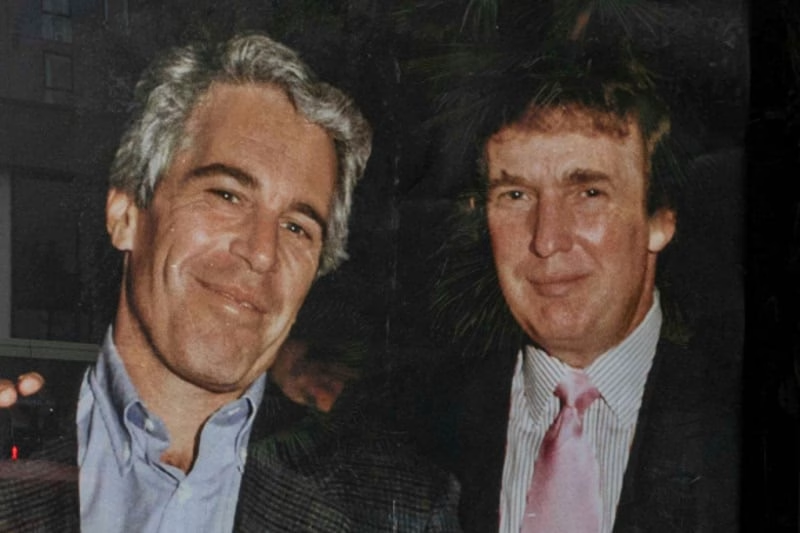
Donald Trump courageously continues his policies despite growing public distrust
The Trump administration is in crisis: purges in government agencies, conflict surrounding the Federal Reserve, and growing discontent over the Epstein case. At the same time, the president’s approval rating remains stable, despite criticism from former allies.
Purges, conflicts and the shadow of Epstein
Trump, who has been attacked by traditional liberals and the radical right for his miscalculations in reform, has not backed down. He has outlined major reshuffles in the State Department, the FBI and the Federal Reserve. Thus, official purges began in the State Department, with thousands of civil servants and 250 professional diplomats in consulates around the world facing layoffs. The White House increased pressure on the Fed and its current chairman, Jerome Powell, with whom Trump has a major conflict. Powell is accused of corruption in the approval of the Fed headquarters renovation project, when the cost of the renovation reached $2.5 billion. In the event of Powell’s early resignation, a serious struggle for the post of Fed chairman will begin between Trump’s advisers, and Finance Minister Scott Bessent may temporarily take this position. This would put the Fed under the direct control of the US Treasury for the first time since the Great Depression. Bessent would follow in the footsteps of Marco Rubio, who became both Secretary of State and National Security Advisor.

Photo by CNN
Meanwhile, within the FBI, the struggle between Trump’s allies has intensified. They are dissatisfied with the Justice Department’s refusal to release all documents related to the case of billionaire paedophile Jeffrey Epstein. Attorney General Pam Bondi is accused of editing video footage from cameras in Epstein’s prison cell. They were divided into parts and run through Premiere Pro, apparently removing all the most interesting and shocking parts. Now the leadership of the FBI and the Justice Department are practically at odds with each other, and the only ones still trying to work in such chaos are the immigration services deporting illegal immigrants. But the rest of the government agencies are mired in a total crisis of the Washington power system, which is little different from the Biden administration, once again casting a shadow on Trump’s reforms.
The Epstein case poses significant risks for the Trump administration.
A joint poll by CNBC and CNN showed that only 3% of Americans are satisfied with the amount of information published in connection with the case of the paedophile financier who committed suicide in 2019 in prison under mysterious circumstances. Among those dissatisfied are not only Democrats, but also 44% of independent voters, 53% of those who tend to vote Republican, and 40% of Republican voters. Moreover, more conservative Republicans and those inclined to vote Republican are statistically more dissatisfied than less conservative Republicans. This poses a threat to Trump personally and to the integrity of the MAGA movement, because the president has survived a serious scandal of his own making when he hyped up the Epstein story and did nothing about it.
Since the beginning of July’s setbacks, Trump’s approval rating has been around 44.4%, which is normal and comfortable for him, as he has been steadily holding steady in the 40-45% range for several months. A CNN poll on the Epstein case showed that 42% of Republicans are either satisfied with the information or indifferent, and this is the core electorate that follows Trump without question. Even if he ends up on a hypothetical ‘list’ of Epstein’s clients, his supporters will perceive it as dirt stuck to a clean hero. There are no signs that the MAGA movement is falling apart or that Trump is losing support, despite headlines about the collapse of Trumpism due to scandal and criticism from former allies such as Steve Bannon, Tucker Carlson, Elon Musk, Nikki Haley and others.

Photo by Thomas Krych /AP Photo
However, none of them will risk waging a real war against Trump. Republicans have forgiven him a lot, and the same will happen with the Epstein story. Trump knows how to shift attention and find unifying themes, and in extreme cases, he will blame Attorney General Pam Bondi or FBI Director Comey for failures, although he wants to avoid unjustified personnel changes. As for the midterm elections in November 2026, even without the scandal, Republicans have little chance of retaining their majority in the House of Representatives: the historical trend is against them, and Democrats will exploit the Epstein issue and economic problems, which could exacerbate their defeat.
The problem is that political wars in Washington and Trump’s isolationist course are depriving the United States of a key advantage — the ability to attract qualified specialists. Tighter immigration policies and cuts in science funding are forcing many professionals, especially scientists, to consider moving. The National Science Foundation is losing half of its budget, the National Institutes of Health is losing 40% of its grants, NASA is cutting funding by 25%, and leading universities, including Harvard, Yale, Georgetown and Johns Hopkins, are losing support. It is estimated that this could reduce US economic growth by 3.8% per year. It is estimated that this could reduce US economic growth by 3.8% per year, and 75% of American scientists are considering moving to more stable countries. China and the EU hope to benefit, although the budget crisis in Europe is even deeper. In response, American corporations are setting up research centres abroad: Amazon has opened a large office in Hyderabad, Microsoft and Google plan to follow suit, and Nvidia is developing an AI centre in Shanghai. It is becoming more difficult to attract specialists from India and China to the US, and businesses are being forced to move their research abroad. Trump is beginning to understand that his ambitious reforms, despite their advantages, have serious consequences.
Assassination attempt, Ukraine and falling ratings
Against this backdrop, a year has passed since the assassination attempt on Trump in the town of Butler, Pennsylvania. The American public demanded that all details of the investigation, which no one has seen to date, be disclosed, and as a result, only a few Secret Service agents were suspended from duty. The US Court of Auditors found that the agents had information about the assassination attempt 10 days before the ill-fated rally in Butler, but ‘accidentally forgot’ to inform all the other agencies that were guarding the event. As a result, Trump did not receive the enhanced protection and full team of snipers required by protocol. As a result, security was mainly provided by Department of Homeland Security employees who had no experience in protecting VIPs. But most importantly, the motive for the assassination attempt on Trump and the reason why the perpetrator’s body was hastily cremated remain unknown.
Data from the shooter’s phones has not been released, and information about possible accomplices is being concealed. Despite mental health issues and taking antidepressants, the attacker prepared thoroughly — he launched a drone for reconnaissance and was able to climb onto the roof of the security booth. Liberals and conservatives suspect that the investigation into the assassination attempt on Trump will repeat the story of the Epstein case, when key facts were concealed. Trump supporters are outraged by the White House’s inaction, even though purges are underway in Washington. The US political class continues to cover up its mistakes, partly thanks to an informal agreement with Trump. His role as a whistleblower is being called into question, although sooner or later the truth may come out.

Trump’s policy on Ukraine has caused a new rift in the MAGA coalition. The president, who previously called aid to Kyiv a relic of the Biden era, is now sending weapons, claiming that the US will not pay for them. This has drawn sharp criticism from Steve Bannon and Tucker Carlson. The White House is trying to strengthen its position in negotiations with Russia without angering the electorate by shifting arms purchases to NATO countries, although it is unclear how this will be implemented. France prefers to spend its military budget within the EU, the UK is facing a budget crisis, Germany is facing a government crisis, and Poland is facing debt. In addition, there are difficulties with the US military-industrial complex producing new weapons, and even one Patriot battery will take several months to prepare for shipment to Europe. The waiting list for new Patriot systems is 5-7 years long, and none of the potential buyers clearly want to wait that long only to then give up their place in the queue to Kiev. The shortage of air defence interceptors and ATACMS missiles exacerbates the situation. Many in the administration recognise the inevitability of Russia’s victory, but are forced to fend off the ‘hawks.’ The deliveries have been formally agreed upon, but the right wing accuses Trump of betraying his principles and colluding with the liberal-conservative establishment.
It is not surprising that the latest scandals have begun to affect Trump’s ratings, and in a recent poll by British YouGov, Trump’s approval rating fell to 41%. A number of factors have contributed to this, including the US government’s awkward response to the catastrophic flooding in Texas and the Epstein case, which has already been described in detail above. Most Americans believe that the enormous losses, which reached 130 people, due to the natural disaster in Texas could have been avoided if the authorities had acted more competently, and Democrats accuse Trump of failing to predict the flooding due to the dismissal of meteorologists.
And yet, the key factor is the ongoing scandal surrounding the White House’s unwillingness to release materials on the case of billionaire paedophile Epstein, even though 80% of Americans demand that the names of all participants in Epstein’s parties be disclosed, and two-thirds accuse Trump himself of deliberately trying to silence the details of the Epstein case. Interestingly, the attitude towards JD Vance as a potential successor is better than towards Trump. Trump’s ratings are falling, but this is not helping his opponents in the Democratic Party, whose support is at a historic low of 40%, while the Republicans have 48%.
In addition, the Democratic Party is experiencing a growing divide between the left and the centrists, and the victory of socialist Zoran Mamdani in the New York mayoral primary has given momentum to the leftist movement in other US cities. In Minneapolis, Mamdani’s ‘clone,’ Somali Omar Fateh, ran for mayor and also promises to fight Trump and save migrants from deportation. The Democratic establishment would like to avoid this kind of left-wing rise, but it is becoming increasingly difficult for it to control processes within its own party. Sensing the weakness of his opponents, Donald Trump is fighting the liberals, despite their painful blows to his ratings.

